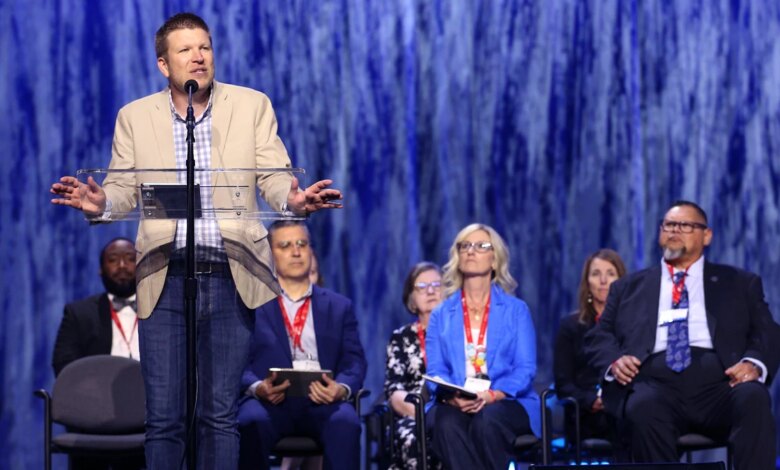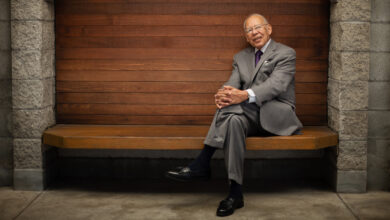Why Does Southern Baptist Abuse Reform Keep Hitting Hurdle…… | News & Reporting

Jules Woodson remembers the spark of hope she felt when a sea of yellow ballots went up across the hall at the Southern Baptist Convention (SBC) annual meeting in 2022. The vote in favor of abuse reform following a watershed abuse investigation was her sign that the messengers cared about victims like her and were willing to listen and make changes.
At this year’s annual meeting in Indianapolis, the recommendations on abuse reform passed again, with another wave of thousands of ballots, but she teared up for a different reason: disappointment over how little had been done.
SBC entities have pledged millions to fund the cause. The convention has repeatedly voted in favor of abuse prevention and response efforts by overwhelming margins. Task forces appointed by the convention president have volunteered their time to develop training resources, a database of abusive pastors, and an office to oversee the ongoing work of abuse reform.
“For messengers for whom abuse isn’t on the forefront of their minds, they think, Oh, we’re doing good,” said Woodson, whose testimony of abuse by her Texas youth pastor launched the #ChurchToo and #SBCToo movements six years ago. “But there’s so much more to be done.”
The abuse victims and advocates calling for reform in the SBC are now watching Southern Baptist leaders within the convention try to navigate the kinds of denominational hurdles and roadblocks they faced for years from the outside.
“We’ve been told over and over again, You can’t do this, you can’t do that,” said Mike Keahbone, a candidate for SBC president who serves on the Abuse Reform Implementation Task Force (ARITF). “You have to ask yourself, Why in the world are we being fought so hard on this issue? … Either you don’t really think there’s a problem or you’ve got something to hide.”
On Tuesday, the task force celebrated a new curriculum to help SBC churches respond to abuse, but the long-awaited database remains empty, and there’s no “permanent home” to oversee abuse reform once their work expires this week.
The messengers in Indianapolis voted to affirm those priorities and to pass the work of the task force onto the Executive Committee, the body that handles SBC business outside of the annual meeting, and its new president, Jeff Iorg.
“Abuse response and prevention efforts grow as we raise awareness, and so I’m thankful to see the excellent work done on the essentials curriculum,” said Keith Myer, a Maryland pastor who has spoken up for the cause, in a statement to CT.
“I’m concerned that a set of relatively simple components in an entire protection system feel controversial and unachievable. A database makes sense and solves the problem of communicating about bad actors across our 50,000 churches. A permanent home for abuse gives churches and pastors someone to talk to when they encounter a crisis, and solves the problem of finding help when they don’t know what to do.”
ARITF chair Josh Wester explained that they learned in January that insurance liability concerns prevented significant, robust reform efforts—including the database—from being hosted by the convention itself. After the task force suggested forming a new nonprofit to launch the database independently, they no longer had access to their funding. The entity heads who offered $3 million said it couldn’t be used outside the SBC.
Wester, a pastor from North Carolina, said the task force did all they could and that members were “beyond frustrated” to not present the database they had readied with over 100 names before hitting hurdles within the SBC. “You only have the means to take the steps you can pay for,” he told reporters. “It has been a real struggle for us.”
The task force has raised $75,000 on their own to fund the independent Abuse Reform Commission. They’re confident the Executive Committee won’t let the database website go empty for another year, and some survivors feel particularly hopeful about Iorg’s leadership. He steps into the role after serving as president of the SBC’s Gateway Seminary in California and has voiced a commitment to help.
Those pushing for reform knew the process would be slow—but it still feels discouraging that even the basic things and first steps they’d laid out aren’t happening yet.
Grant Gaines, a pastor from Tennessee, is concerned about losing the significance of the moment as implementation continues to get delayed.
“The survivors told us from the beginning this is going to be hard and to expect roadblocks, even from people you like and trust,” said Gaines, who put forward the 2021 motion calling for an investigation into the Executive Committee’s abuse response.
The concerns over liability and funding that the ARITF came up against over the past two years reflect some ongoing reservations about the convention’s attempt to address abuse—particularly as the dollar amounts continue to add up.
From the stage, Wester had to repeat clarifications that the abuse reform efforts don’t interfere with church autonomy and that abuse does not have to be widespread for the convention to improve its response.
“When it comes to sexual abuse, the problem for the Southern Baptist Convention was never that we had abuse occurring at wildly disproportionate rates or that our convention was shot through with abusers,” he told the messengers. “Instead, the problem that we faced is grappling with the fact that the Southern Baptist Convention, having more than 10 million members and nearly 50,000 churches, as America’s largest Protestant body, had no meaningful plan to help its churches prevent or respond to sexual abuse.”
Motions made to only hire legal counsel that reflect the convention’s values, or to launch an inquiry to tally the total spent on conducting an investigation into its abuse response, indicate that a faction within the SBC still holds a lingering sense of regret over the fallout of the 2022 Guidepost Solutions report.
Iorg mentioned that they’ve paid at least $2 million just to cover indemnity costs after two people named in the report sued (former SBC president Johnny Hunt and former seminary professor David Sills).
“We have to equip the shepherds to protect the sheep from the wolves. It can be done—it can be done within polity, it can be done well. And for a variety of reasons, it kept getting pushed off and people continued to get hurt,” said Bruce Frank, former head of the initial Sexual Abuse Task Force and a pastor in North Carolina. “Is $2 million a lot of money? Yes, it is—but it is nowhere near what it has cost survivors.”
Task force members and advocates are grateful to see the continued support for their efforts from the convention floor—but frustrated that the enthusiasm from Southern Baptists at the meeting hasn’t overridden the challenges that emerge when trying to enact change at the convention level.
Survivors decried entity leaders’ legal involvement with a Kentucky amicus brief last year that would limit their liability in sexual abuse claims, and a motion from the floor called for the SBC to censure convention president Bart Barber, Southern Seminary president Albert Mohler, and Lifeway president Ben Mandrell for approving the brief. The messengers voted it out of order on Wednesday morning.
Entities within the SBC have also been the subject of a Department of Justice investigation that began nearly two years ago and issued its first indictment last month.
Frank and Keahbone, both candidates who had been involved in abuse reform efforts, did not make the runoffs in the presidential race this year. In a forum on Monday night, Keahbone referenced people “stepping in our way” and “working purposely on the sides to make sure [the database] doesn’t happen.”
Gaines asked the task force if they would reveal who is responsible for obstructing their work and how, but so far those involved have not named names. In remarks to the media, Wester said he did not want to further “compound the problem by going into too much detail.”
Two years ago, International Mission Board president Paul Chitwood, North American Mission Board president Kevin Ezell, and Send Relief president Bryant Wright had offered $3 million from Send Relief’s undesignated funds to pay for the SBC’s sexual abuse reform programs. A spokesman for Send Relief told CT that its leaders have “not rejected any requests for funding that fall within the original intent of its commitment.”
“Send Relief is fully committed to the careful stewardship of the funds for sexual abuse prevention and response efforts within the SBC, in collaboration with the Executive Committee,” the statement said. “Currently the [Abuse Reform Commmission] is outside the structure of the SBC.”
Myer worries that confusion about the funding decisions could damage the sense of trust needed for broader cooperative efforts around the issue to be effective.
“When trust fails, you lose partners and resources,” he said. “If we can’t sort out something easy like saying, It is critical that we protect children and adults from being abused by wolves, how will we move on to more complicated matters?”




